By: Ankita Kulkarni
August 11 2023

Sunscreen protects against UV rays that can cause cancer. It is, in fact, safe and widely used as a protective measure against cancer.
Context
A viral post on TikTok claims, “Sunscreen causes cancer, not the sun.” It states sunscreen is associated with “low sperm count, thyroid issues, early puberty, ovarian cancer, breast cancer, prostate cancer, and blood cancer.” Several other posts on TikTok also state that these contain “cancer-causing chemical benzene.” Social media posts like these regularly resurface during summer with similar narratives. The archive post can be found here.
However, the claims made in these videos are inaccurate and are not backed by scientific evidence.
In fact
It is not sunscreen, but the harmful UV rays from the sun that causes cancer. Sunscreen is regulated by the United States, Food and Drug Administration (FDA). It clearly states sunscreen “helps to prevent sunburn or to decrease the risks of skin cancer and early skin aging caused by the sun."
The American Cancer Society explains that UVA, UVB, and UVC rays can affect and damage the skin. UVA can cause skin cells to age and can cause some indirect damage to cells' DNA. UVB can damage the DNA in skin cells directly and are the main rays that cause sunburns and can cause skin cancer. It adds that sunlight is the main source of UV radiation.
The American Academy of Dermatology (AAD) notes, "Scientific evidence supports the benefits of using sunscreen to minimize short-term and long-term damage to the skin from the sun's rays." There is no evidence to support that sunscreens can cause cancer. It recommends using a broad-spectrum sunscreen with SPF 30 or higher that is water resistant.
A scientific literature review published in the National Center for Biotechnology Information(NCBI) in 2014 on the efficacy and safety of sunscreen concluded: "High-quality evidence has shown that sunscreen reduces the risk of developing both melanoma and nonmelanoma skin cancer."
Research published in July 2021 and updated in 2023 in NCBI reviewed the benefits of using sunscreens and found chemical sunscreens consist of UVA and UVB blockers. It noted that many "sunscreens include antioxidants such as vitamin C, vitamin E, silymarin, and green tea polyphenols." These protect from sunburn and erythema, decrease immunosuppression, erythema, photoaging, and photocarcinogenesis, and are anti-inflammatory and anti-carcinogenic.”
Furthermore, benzene is not usually added to sunscreen. It has indeed been classified as carcinogenic to humans by the International Agency for Research on Cancer (IARC). Their presence in the sunscreen draws back to an incident in 2021 when a U.S. company named Valisure analyzed 294 batches of sunscreen and found the presence of benzene in them. However, most of them contained benzene in concentrations between 0.1 ppm and 2.0 ppm, which is below the threshold restricted by FDA.
Speaking to Logically Facts, Dr. DM Mahajan, a dermatologist based in India, told us that “Sunscreens protect skin from harmful UV rays that are emitted by the sun. Currently, there is no evidence that it causes any sort of cancer in humans. These are all unfounded, and there is no scientific proof for it.”
The verdict
The harmful UV radiation from the sun causes cancer, not sunscreen. Sunscreen is used as a shield for blocking UV rays from being absorbed by the skin. Claims that it causes other kinds of cancers in humans are also unfounded, and there is no scientific evidence for it. Therefore we have marked the claim as false.